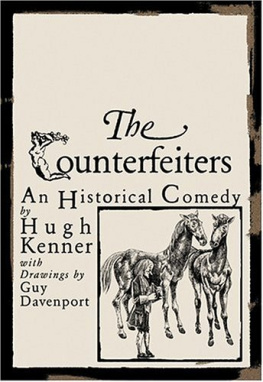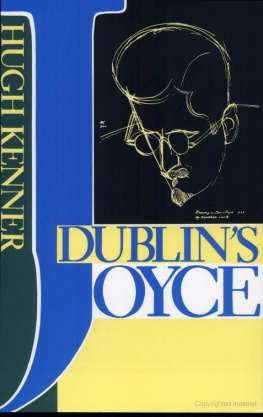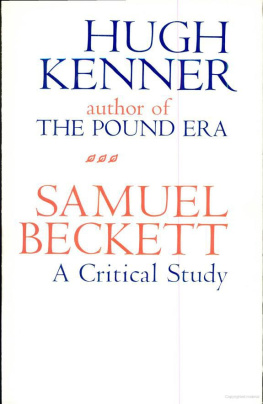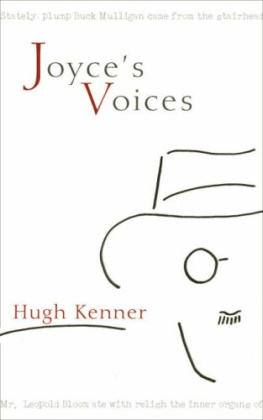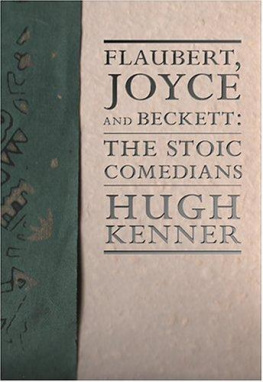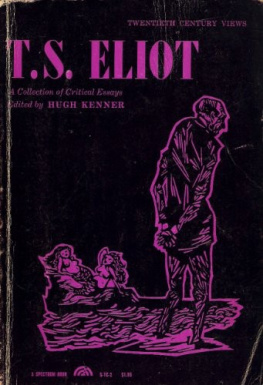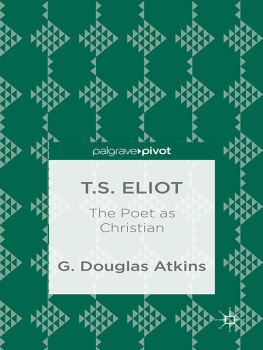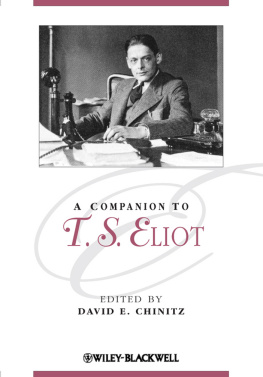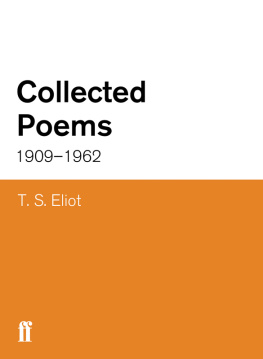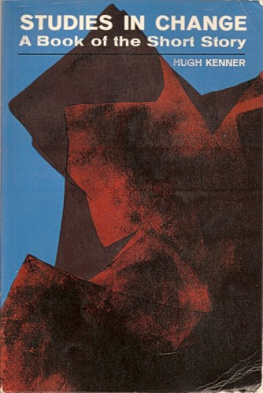Hugh Kenner - The Invisible Poet: T.S. Eliot
Here you can read online Hugh Kenner - The Invisible Poet: T.S. Eliot full text of the book (entire story) in english for free. Download pdf and epub, get meaning, cover and reviews about this ebook. year: 1965, publisher: Routledge, genre: Detective and thriller. Description of the work, (preface) as well as reviews are available. Best literature library LitArk.com created for fans of good reading and offers a wide selection of genres:
Romance novel
Science fiction
Adventure
Detective
Science
History
Home and family
Prose
Art
Politics
Computer
Non-fiction
Religion
Business
Children
Humor
Choose a favorite category and find really read worthwhile books. Enjoy immersion in the world of imagination, feel the emotions of the characters or learn something new for yourself, make an fascinating discovery.

- Book:The Invisible Poet: T.S. Eliot
- Author:
- Publisher:Routledge
- Genre:
- Year:1965
- Rating:4 / 5
- Favourites:Add to favourites
- Your mark:
- 80
- 1
- 2
- 3
- 4
- 5
The Invisible Poet: T.S. Eliot: summary, description and annotation
We offer to read an annotation, description, summary or preface (depends on what the author of the book "The Invisible Poet: T.S. Eliot" wrote himself). If you haven't found the necessary information about the book — write in the comments, we will try to find it.
The Invisible Poet: T.S. Eliot — read online for free the complete book (whole text) full work
Below is the text of the book, divided by pages. System saving the place of the last page read, allows you to conveniently read the book "The Invisible Poet: T.S. Eliot" online for free, without having to search again every time where you left off. Put a bookmark, and you can go to the page where you finished reading at any time.
Font size:
Interval:
Bookmark:
HUGH KENNER
McDOWELL, OBOLENSK New York
-iii-
COPYRIGHT 1959 By HUGH KENNER
All Rights Reserved under Pan-American and International Copyright Conventions. Published in the United States of America by McDowell, Obolensky Inc., and simultaneously in the Dominion of Canada by George J. McLeod Limited, Toronto
LIBRARY OF CONGRESS CATALOG CARD NUMBER: 59-7118
Manufactured in the United States of America by Quinn & Boden Company, Rahway, N. J.
Designed by Leonard W. Blizard
The quotations throughout the volume from the following works of T. S. Eliot are reprinted by permission of Harcourt, Brace and Company, Inc.: COLLECTED POEMS 1909-1935, copyright, 1936, by Harcourt, Brace and Company, Inc.; FOUR QUARTETS, copyright, 1943, by T. S. Eliot; SELECTED ESSAYS 1917-1932, copyright, 1932, by Harcourt, Brace and Company, Inc.; THE ROCK, copyright, 1934, by Harcourt, Brace and Company, Inc.; MURDER IN THE CATHEDRAL, copyright, 1935, by Harcourt, Brace and Company, Inc.; THE FAMILY REUNION, copyright, 1939, by T. S. Eliot; THE COCKTAIL PARTY, copyright, 1950, by T. S. Eliot; THE CONFIDENTIAL CLERK, copyright, 1954, by T. S. Eliot.
Acknowledgment is also made to Harcourt, Brace and Company, Inc., for all selections (except the first) appearing on pages ) from A MAP OF VERONA And Other Poems, copyright, 1947, by Henry Reed.
-iv-
for R. B. Robinson amicus curiae
-v-
The dogmatic critic, who lays down a rule, who affirms a value, has left his labour incomplete. Such statements may often be justifiable as a saving of time; but in matters of great importance the critic must not coerce, and he must not make judgments of worse and better. He must simply elucidate. The reader will form the correct judgment for himself.
-- T. S. Eliot, 1920.
Never commit yourself to a cheese without having first examined it.
-- T. S. Eliot, 1956.
-vi-
| |||||||
| |||||||
| |||||||
| |||||||
| |||||||
| |||||||
| |||||||
| |||||||
| |||||||
|
-vii-
|
Impenetrability! That's what I say!
--Humpty Dumpty.
We may assume that everyone by this time knows who T. S. Eliot is, that it is no longer necessary to testify to his lucidity, that there are as many handbooks as needed, that his religious affiliation is neither a cachet nor a curiosity, that his private life deserves to remain no less private than he has chosen to keep it, and that scholarship has barely omitted to scrutinize a line (unless perhaps "jug jug jug..."). Yet opinion concerning the most influential man of letters of the twentieth century has not freed itself from a cloud of unknowing. He is the Invisible Poet in an age of systematized literary scrutiny, much of it directed at him.
This is partly a deliberate achievement (he is the "impersonal" poet, and also Old Possum), partly the result of chance, but chiefly a consequence of the nature of his writing, which resists elucidation as stubbornly as Alice in Wonderland. Though he became, while still a "difficult" writer, very famous, he was for years the archetype of poetic impenetrability. It was a safe joke only a decade ago to suggest that the BBC maintain its standard of entertain
-ix-
ment by having T. S. Eliot cerebrate silently in front of a microphone for ninety minutes. Discussion of the poems, which total fewer than four thousand lines, still slips off into ideas, when it doesn't begin there.
Or it is mesmerized by personality. Here Eliot himself, "a master," Marianne Moore has noted, "of the anonymous," has added considerably to the fun. He can give, for readers and interviewers alike, consummate imitations of the Archdeacon, the Publisher, the Clubman, the Man of Letters in Europe, the Aged Eagle, the Wag, and the Public-Spirited Citizen. He has also written hundreds of publisher's blurbs, many of them, to the suspicious eye, small comic masterpieces. The only role he refuses to play is the Poet. He has been described vying at anagrams with John Maynard Keynes, quoted (aged 69) as intending to take up dancing lessons, discerned composing a letter to the London Times on the subject of Stilton cheese, and variously decried as a snob, a proto-fascist, the nucleus of an insidious authoritarian conspiracy, and "a sick, suffering and defeated personality." It has even been hinted--again by Miss Moore--that he may write detective stories under a pseudonym.
He commands vast influence, partly through moral consistency, partly through inscrutability, partly because, in an academic context, his prose is so quotable. The details of his poetic effects, furthermore, belong to an extremely conventional category: the tradition of the turned aphorism and the weighty line. That they also subvert this tradition is a consideration that has vaguely troubled many readers, who accordingly suppose that the poet and the traditionloving critic are two different men.
These difficulties can be evaded by the methods of the line-by-line commentary. Commentators, one of them has
-x-
noted, tour the Eliot territory in chartered buses. He has innumerable "sources," some acknowledged, some covert. they can be listed. He has images that recur, and their recurrence can be noted. He has also operated, in his later work, so near the border-line of "ideas" that wherever technical commentary fails, paraphrase can readily be trundled in. And salient passages in certain of his essays have provided a generation of literary middlemen with first-rate critical gimmicks. To be sure, when a painstaking explication of one of his poems is laid before him, he is likely to reply that he was not aware of having been so clever, being mainly occupied at the time of writing with matters of assonance, cadence, and congruity; but the hint is not taken.
Font size:
Interval:
Bookmark:
Similar books «The Invisible Poet: T.S. Eliot»
Look at similar books to The Invisible Poet: T.S. Eliot. We have selected literature similar in name and meaning in the hope of providing readers with more options to find new, interesting, not yet read works.
Discussion, reviews of the book The Invisible Poet: T.S. Eliot and just readers' own opinions. Leave your comments, write what you think about the work, its meaning or the main characters. Specify what exactly you liked and what you didn't like, and why you think so.

